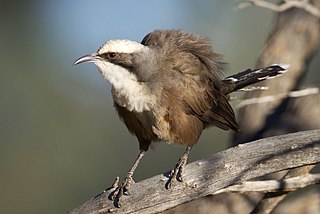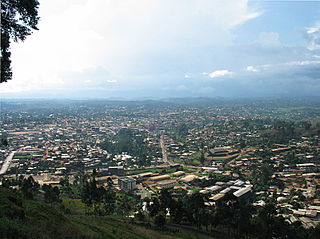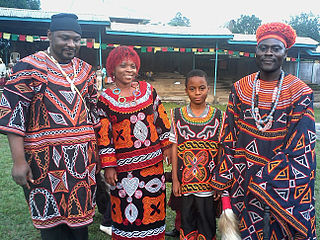
The Gundabooka National Park is a protected national park in the north-west region of New South Wales, in eastern Australia. The 63,902-hectare (157,910-acre) national park is located approximately 820 kilometres (510 mi) northwest of Sydney. The nearest town is Bourke, 70 kilometres (43 mi) to the north.

Bamenda, also known as Abakwa and Mankon Town, is a city in northwestern Cameroon and capital of the Northwest Region. The city has a population of about 2 million people and is located 366 km (227 mi) north-west of the Cameroonian capital, Yaoundé. Bamenda is known for its cool climate and scenic hilly location.

Mankon is a geo-historic community constituting a large part of Bamenda in Cameroon, formed as an amalgamation of about five different ethnic groups. The Mankon fondom (kingdom) represents one of the oldest monarchies of the grassfield people of the Northwest Province. The fondom is ruled by a fon (king) with rights to kinghood acquired by birth. The crowned fon is usually a designated son of the deceased king, a child who was born only during his reign.
The Bafut Wars were a series of wars fought in the early 20th century between the troops of the Fon of Bafut and German-backed troops of neighbouring fondoms and German troops. The wars ultimately led to a defeat for the Fon of Bafut, forcing him into exile, and making the Fondom of Bafut part of the German protectorate of Kamerun.
The Ngiyambaa language, also spelt Ngiyampaa, Ngempa, Ngemba and other variants, is a Pama–Nyungan language of the Wiradhuric subgroup. It was the traditional language of the Wangaibon and Weilwan peoples of New South Wales, Australia, but is now moribund; according to Donaldson by the 1970s there were only about ten people fluent in Wangaibon, whilst there were only a couple of Weilwan speakers left.
In linguistics, upstep is a phonemic or phonetic upward shift of tone between the syllables or words of a tonal language. It is best known in the tonal languages of Sub-Saharan Africa. Upstep is a much rarer phenomenon than its counterpart, downstep.
The Bamileke languages are a group of Eastern Grassfields languages spoken by the Bamileke people in the Western High Plateau of Cameroon.

Cameroon is home to at least 250 languages. However, some accounts report around 600 languages. These include 55 Afro-Asiatic languages, two Nilo-Saharan languages, four Ubangian languages, and 169 Niger–Congo languages. This latter group comprises one Senegambian language (Fulfulde), 28 Adamawa languages, and 142 Benue–Congo languages . French and English are official languages, a heritage of Cameroon's colonial past as a colony of both France and the United Kingdom from 1916 to 1961. Eight out of the ten regions of Cameroon are primarily francophone, representing 83% of the country's population, and two are anglophone, representing 17%. The anglophone proportion of the country is in constant regression, having decreased from 21% in 1976 to 20% in 1987 and to 17% in 2005, and is estimated at 16% in 2015.
Kpati is an extinct Grassfields language formerly spoken in the Wukari and Takum LGAs of Taraba State, Nigeria. It was first reported as extinct by Grimes, Barbara (1984). Kpati was classified as a Ngemba language by Fivas – Scott (1977).

The Mankon Museum is an art and cultural museum located in Mankon-Bamenda, Cameroon.
The Eastern Grassfields languages, spoken in the Western High Plateau of Cameroon, are a branch of the Grassfields languages including Bamun, Yamba and Bamileke.

The Ngemba languages are a group of Eastern Grassfields languages of the Western High Plateau of Cameroon.
Our Lady of Lourdes College, Mankon, is a Roman Catholic, all-girls secondary school located in Mankon, Bamenda in the North-West Region of Cameroon. It is run by the Holy Rosary Sisters under the authority of the Archdiocese of Bamenda. The school is reputed for producing some of the best results in the General Certificate of Education Ordinary and Advanced Levels in Cameroon.

Mankon is a Grassfields language spoken in Cameroon. It is closely related to Mundum and Mendankwe-Nkwen. Along with Mundum, it is called Ngemba. There are several distinct dialects: Mankunge (Ngemba), Nsongwa, Shomba, Mbutu (Bambutu), Njong (Banjong), Bagangu (Akum) and Alatening.

Rainbow Football Club, also known as Rainbow or Rainbow Bamenda, is a Cameroonian football club.
The Weilwan are an Aboriginal Australian people of the state of New South Wales. They are a clan of the Ngiyampaa nation.
The Ngiyampaa, also known as the Ngemba, are an Aboriginal Australian people of the state of New South Wales. The generic name refers to an aggregation of three groups, the Ngiyampaa, the Ngiyampaa Wangaaypuwan, and the Ngiyampaa Weilwan, respectively clans of a larger Ngiyampaa nation.

Fon Angwafo III of Mankon was a Cameroonian traditional ruler.




























